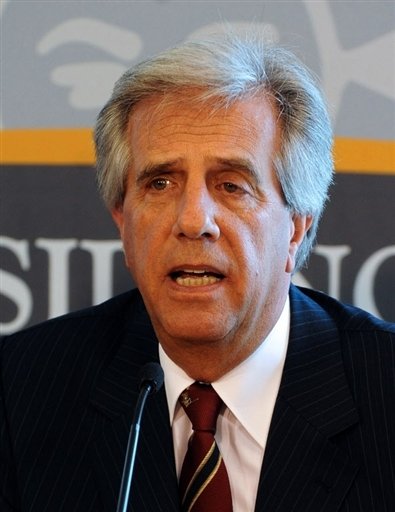Laptop becomes reality for Uruguay's schoolchildren
Marina de Russe
LAS PIEDRAS, Marina de Russe - A laptop is now finding its place alongside a notebook and pen in schoolbags in Uruguay, the first and only country to offer Internet-connected computers to all public primary school students.
In the small town of Poquitos, some 30 kilometers (18.6 miles) north of Montevideo, about 20 students study The Odyssey by singing, drawing and even rewriting Homer's epic poem with the help of their apple green laptops.

"Here I drew the picture of Ulysses arriving on Calypso's island!" exclaimed nine-year-old Facundo, pointing at his computer screen.
In all, 380,000 computers have been distributed free of charge to public school students and teachers in this South American country of 3.34 million sandwiched between Argentina and Brazil.
The decision has not always pleased the teachers. Some would have preferred to use the funds to reform the local school system or to increase teacher salaries.
But student enthusiasm has won them over and they now use the "XO" mini computers several times a week.
"I believe that encouraging each child's passions and inclinations is important," said Flavia Ortiz, Facundo's teacher.
These energy-efficient portable computers equipped with the Linux operating system were invented by Massachusetts Institute of Technology (MIT) professor Nicholas Negroponte.
The US scientist founded "One Laptop per Child," a group that campaigns to provide some of the world's poorest children rugged, low-cost and energy-efficient laptop with Internet connectivity and learning software.
Uruguay's first left-wing president, Tabare Vazquez, ordered the computers for the country's schools in 2006. The three-year tax-free project cost a total of 94 million dollars, or 248 dollars per computer, including payments for Internet connections and repairs.
The amount accounts for less than five percent of the primary school budget, according to Miguel Brechner, who heads the program.
"The goal is to teach students how to work in a different way, so they can get better jobs five to six years from now," said Brechner.
"But we also would like to give students equal opportunity. As a result of this decision 220,000 more household now have a computer, and half of them are among the poorest ones."
On Monday, ahead of the November 29 presidential election, left-wing parties announced their intention to extend the "Ceibal" program to high school students.
The computers are equipped of a photo camera. With its help, students can play journalists or do research on the Internet.
The Internet has not yet reached the Poquitos school, as with 25 percent of Uruguay's primary schools.
But all schools are scheduled to be equipped with wireless connectivity by year's end.
At home, children can lend their laptops to their parents. For some adults who have never touched a keyboard, it is a window into a new world, albeit one fraught with new responsibilities.
"You have to click on a small icon, and there, the computer tells you what your child has been looking up on the Internet," explained Richard Godoy, the father of Valentina, another student.
The program is still too recent to measure its impact.
But for the students, computers have become a reality and necessity even after the bell rings.
Swarms of children can now be seen sitting on the sidewalks near school, tapping away on their keyboards.
--------------------------------------------------------------------------------------------------------------------------------